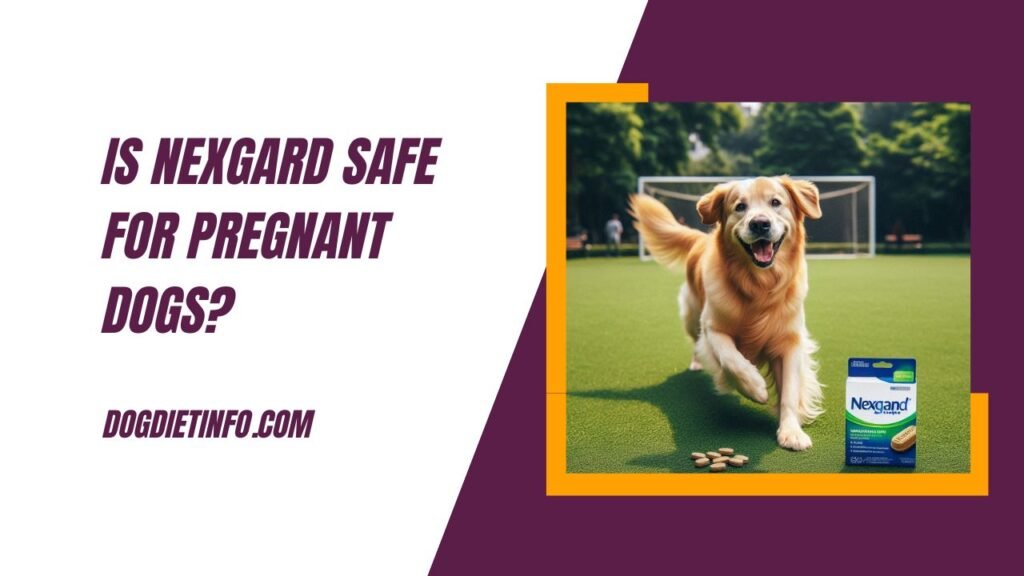Is Nexgard Safe For Pregnant Dogs? Nexgard’s safety for pregnant or lactating dogs hasn’t been established, so it’s generally recommended to consult a veterinarian before use.
When it comes to pet care, dog owners want the best for their furry friends, especially during critical times like pregnancy.
Nexgard, a well-known medication for flea and tick prevention, is widely used by pet owners due to its convenience and effectiveness.
However, when a dog is pregnant, extra caution is needed when it comes to any medication, including Nexgard.
This article explores the details of Nexgard, examines its safety for pregnant dogs, and provides alternative solutions to ensure your dog’s health during pregnancy.
Contents
- 1 What is Nexgard?
- 2 Can Pregnant Dogs Take Nexgard?
- 3 Alternative Options for Flea and Tick Prevention in Pregnant Dogs
- 4 Potential Risks of Using Nexgard on Pregnant Dogs
- 5 Consulting Your Veterinarian
- 6 Final Verdict
- 7 FAQs
- 7.1 Can Nexgard be used safely for nursing dogs?
- 7.2 What happens if my pregnant dog accidentally takes Nexgard?
- 7.3 Are there any symptoms to watch for if my dog is given Nexgard while pregnant?
- 7.4 What are some safe flea treatments for dogs during pregnancy?
- 7.5 How long after pregnancy can a dog resume using Nexgard?
- 8 Conclusion: Is Nexgard Safe For Pregnant Dogs?
What is Nexgard?
How Nexgard Works
Nexgard is an oral chewable that protects dogs from fleas and ticks. [Is Nexgard Safe For Pregnant Dogs?]
Its active ingredient, afoxolaner, is an insecticide and acaricide that targets the nervous systems of fleas and ticks, leading to paralysis and death.
It provides a systemic form of protection by working through your dog’s bloodstream, effectively killing pests upon contact.
Afoxolaner is classified as an isoxazoline, a class of drugs that targets neurotransmission in parasites but is generally well-tolerated by dogs. [Is Nexgard Safe For Pregnant Dogs?]
Once ingested, Nexgard works for up to a month, making it a convenient option for dog owners who need consistent flea and tick control without frequent applications.
Common Uses of Nexgard
Nexgard is often prescribed for:
- Preventing flea infestations.
- Reducing the risk of tick-borne diseases like Lyme disease.
- Offering a monthly dose that’s easy for pet owners to administer and dogs to consume.
Nexgard’s chewable formula is highly palatable for dogs, which makes it easier to administer compared to topical treatments or sprays.
However, it is important to note that its safety and efficacy are primarily established for healthy adult dogs, not for pregnant or lactating animals.
Can Pregnant Dogs Take Nexgard?
Safety Concerns During Pregnancy
When a dog is pregnant, there are increased concerns regarding the potential impact of medications on both the mother and the developing puppies.
Pregnancy is a delicate period, as certain substances can cross the placental barrier and affect the unborn puppies.
This raises questions about whether Nexgard’s active ingredients could pose risks during this vulnerable phase.
While Nexgard’s active ingredient, afoxolaner, is generally safe for most dogs, the risks may vary for pregnant dogs.
Pregnant animals may have altered metabolisms, potentially affecting how medications are processed in their bodies.
Therefore, medications that are safe for non-pregnant dogs may carry unknown risks for pregnant ones. [Is Nexgard Safe For Pregnant Dogs?]
Manufacturer’s Guidelines
The product label on Nexgard specifically mentions that its safety has not been established in pregnant, breeding, or lactating dogs.
This means that, while Nexgard has undergone extensive testing for healthy adult dogs, there is a lack of conclusive research on its effects during pregnancy.
As a result, the general recommendation is to avoid its use in pregnant dogs unless absolutely necessary. [Is Nexgard Safe For Pregnant Dogs?]
The absence of specific testing for pregnancy-related safety does not automatically mean that Nexgard is harmful, but it does suggest that dog owners should proceed with caution.
Veterinarians typically rely on well-documented research when prescribing medications, and without such data, it is challenging to make definitive recommendations for or against Nexgard during pregnancy.
Research and Studies on Nexgard in Pregnant Dogs
Research on Nexgard’s safety in pregnant dogs is limited, as most studies focus on healthy adult dogs. [Is Nexgard Safe For Pregnant Dogs?]
Afoxolaner has been extensively tested for efficacy and safety in controlling flea and tick populations, but few, if any, studies specifically address its impact on pregnant dogs or their puppies.
While Nexgard has been linked to side effects like vomiting and diarrhea in some dogs, there is no clear data on how it might affect pregnancy outcomes.
Studies conducted on other medications in the same drug class have sometimes shown that they can cross the placenta, which is why veterinarians exercise caution with similar drugs during pregnancy.
Veterinarian Recommendations
Given the lack of clear evidence on Nexgard’s safety for pregnant dogs, veterinarians usually recommend alternative flea and tick control methods for expectant mothers.
Veterinarians prioritize the health and safety of both the mother and the unborn puppies, so they often advise using products with better-documented safety profiles for pregnancy.
If you are considering using Nexgard for a pregnant dog, consult with your veterinarian. [Is Nexgard Safe For Pregnant Dogs?]
They may have additional insights based on your dog’s health history, breed, and specific needs, and they can help guide you toward the best decision.

Alternative Options for Flea and Tick Prevention in Pregnant Dogs
Natural Remedies
For pet owners seeking non-chemical options, natural remedies can offer a safer alternative to traditional medications:
- Herbal Sprays: Herbal sprays containing essential oils like lavender, cedarwood, or eucalyptus can help deter fleas and ticks. Ensure that any oils used are safe for dogs, as some can be toxic in certain quantities.
- Apple Cider Vinegar: A diluted apple cider vinegar rinse can make your dog’s skin less attractive to fleas. Mix equal parts vinegar and water and spray lightly onto your dog’s coat.
- Diatomaceous Earth: Food-grade diatomaceous earth can be sprinkled on your dog’s bedding and areas they frequent. It works by drying out flea larvae, helping to prevent infestations without chemicals.
Other Safe Medications
Some flea prevention products have better-established safety profiles for pregnant dogs. Veterinarians may recommend:
- Topical Treatments: Certain topical flea treatments are considered safer for use during pregnancy. These are applied to your dog’s skin and are less likely to affect the puppies.
- Oral Flea Preventatives with Safety Data: Some oral flea preventatives have been tested in pregnant dogs. Be sure to check with your veterinarian to identify options that meet this criterion.
Preventative Care
Keeping your dog’s environment clean can help reduce the need for medications. Washing bedding frequently, vacuuming carpets, and maintaining a clean yard can all lower the risk of flea and tick infestations.
During warmer months, limit your dog’s exposure to high-risk areas, such as wooded regions or tall grasses. [Is Nexgard Safe For Pregnant Dogs?]
Potential Risks of Using Nexgard on Pregnant Dogs
Side Effects of Nexgard
While Nexgard is generally well-tolerated, side effects can occur. These include:
- Gastrointestinal Issues: Vomiting, diarrhea, and loss of appetite are common side effects.
- Lethargy: Some dogs may become more tired or inactive after taking Nexgard.
- Allergic Reactions: While rare, allergic reactions can include swelling, itching, and difficulty breathing.
In a pregnant dog, these side effects could affect not only her health but also the health of the developing puppies.
Any sign of an adverse reaction should be addressed immediately with veterinary support. [Is Nexgard Safe For Pregnant Dogs?]
Risks to Puppies
If Nexgard’s active ingredient can cross the placenta, it may impact the puppies. This could potentially lead to developmental issues, although no specific data exists on how Nexgard affects fetal development.
After birth, if a dog is still lactating and takes Nexgard, there’s a risk that the medication could be passed to the puppies through the mother’s milk.
When to Seek Immediate Help
If your pregnant dog accidentally ingests Nexgard, keep an eye out for adverse reactions. These might include:
- Persistent vomiting or diarrhea.
- Signs of discomfort or distress, such as whining or excessive restlessness.
- Difficulty breathing or swelling, which may indicate an allergic reaction.
If you observe any of these symptoms, contact your veterinarian immediately for guidance on how to proceed.
Consulting Your Veterinarian
Importance of Professional Advice
When it comes to flea and tick prevention for pregnant dogs, the best approach is to consult with your veterinarian. [Is Nexgard Safe For Pregnant Dogs?]
They are equipped to evaluate your dog’s health, consider any potential risks, and recommend a safe course of action.
Always provide your vet with detailed information about any symptoms or changes in your dog’s behavior, as this can help them make an informed decision.
Questions to Ask
When discussing flea and tick prevention with your vet, you may want to ask:
- Are there any non-chemical flea prevention options that are effective for pregnant dogs?
- What are the potential risks of using Nexgard or similar medications during pregnancy?
- How soon after giving birth can my dog safely resume flea and tick medications?
- What symptoms should I watch for if my dog has an adverse reaction to flea prevention products?
Final Verdict
While Nexgard is an effective and convenient flea and tick control option, it may not be the safest choice for pregnant dogs.
With limited data on its effects during pregnancy, veterinarians generally recommend alternative methods for flea prevention in pregnant pets.
Maintaining a clean environment and considering natural or safer medication alternatives can help protect both the mother and her puppies.
See Also: Is Chapstick Bad For Dogs? Important Facts
FAQs
Can Nexgard be used safely for nursing dogs?
Nexgard has not been specifically tested on nursing dogs, so it’s best to consult with your vet before using it while your dog is lactating.
What happens if my pregnant dog accidentally takes Nexgard?
Contact your veterinarian immediately and monitor for symptoms like vomiting, lethargy, or signs of an allergic reaction. [Is Nexgard Safe For Pregnant Dogs?]
Are there any symptoms to watch for if my dog is given Nexgard while pregnant?
Typical side effects may include vomiting, diarrhea, and lethargy. If you observe any unusual symptoms, consult your vet promptly.
What are some safe flea treatments for dogs during pregnancy?
Your veterinarian can recommend topical treatments or non-chemical alternatives with established safety profiles for pregnant dogs.
How long after pregnancy can a dog resume using Nexgard?
Many vets advise waiting until the puppies are weaned before reintroducing Nexgard or any similar medication.
Conclusion: Is Nexgard Safe For Pregnant Dogs?
When it comes to flea and tick prevention for pregnant dogs, caution is key. [Is Nexgard Safe For Pregnant Dogs?]
Nexgard’s safety for expectant mothers is uncertain, making it wise to explore alternative options or natural remedies.
Consulting with a veterinarian is essential to ensure you’re making the best decisions for your dog and her puppies.
Ultimately, your dog’s health—and the health of her future puppies—is worth the extra care and consideration.

Derrick Wilcox is a certified canine behaviorist with over 12 years of experience at Happy Paws Animal Clinic and Pawsitive Training Center, helping pet owners ensure safer, healthier, and happier lives for their dogs.



